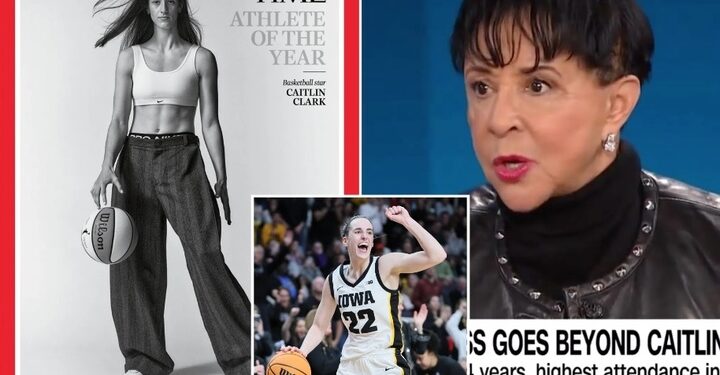
The “W” in the WNBA is supposed to stand for “women” — but lately, it feels like it means “whiny.”
Even before Caitlin Clark put on an Indiana Fever jerseylast spring, there was a nonstop effort from a certain camp of pundits, media and other players to racialize her, smear her, and diminish both her ability on the court and the steroidal growth she alone has infused into the league.
The latest temper tantrum is from Washington Mystics co-owner and multi-millionaire Sheila Johnson, who went on CNN over the weekend to cry about Clark being recognized as Time’s Athlete of the Year — the first ever WNBA star to earn the distinction.
“While Caitlin Clark is undoubtedly talented, putting one individual on such a pedestal can foster resentment in a team sport like basketball,” said Johnson. “It doesn’t reflect the collective efforts that make the game so special … When you just keep singling out one player, it creates hard feelings.”
Wah. As a businesswoman, Johnson should be showing gratitude — not resentment.
Instead, she advocated for a participation trophy, asking why Time “couldn’t have put the whole WNBA on that cover.”
But without Clark, who was named rookie of the year, the league isn’t even sniffing a fraction of the relevance it’s enjoyed since she was drafted first overall by the Fever.
In Johnson’s appeal for equity — a poisonous principle in itself — she painted a demeaning portrait of females. The league has been sold as a showcase of hard-nosed, physical basketball and unrelenting competition, and one that only needed exposure to catch on and become as big as the NBA.
But here is Johnson, essentially saying these lady ballers are really lady bawlers: emotionally weak, thin skinned, jealous and petty.
So which is it?
Was Johnson upset when the Mystics moved their September 19 game against the Fever from their 4,200-seat home venue to DC’s Capital One Arena — where 20,711 fans showed up, the largest crowd in WNBA history?
She does not represent all of women’s hoops, of course, but those sour grapes didn’t spoil in a vacuum.
Legendary player Sheryl Swoopes seems to have a physical reaction when Clark’s name is brought up. And league MVP A’ja Wilson used the phenom’s popularity to complain, saying, “It doesn’t matter what we all do as black women, we’re still going to be swept underneath the rug. That’s why it boils my blood when people say it’s not about race, because it is.”
But this is all burying the undeniable facts of the Clark effect, which has boosted viewership and attendance by eye-popping percentages.
Johnson’s remarkscome on the heels of Clark’s controversial Time interview, in which she said, “I want to say I’ve earned every single thing, but as a white person, there is privilege.” She added that the league has been “built” on black players and said she wants to uplift them.
Clark was wrong to tie her success to privilege rather than simply ability, hard work and freakish focus.
There’s also timing, over which she had no control. Clark was in college during the passing of NIL, which has allowed athletes to capitalize off their name, image and likeness — meaning she earned endorsements and a spotlight that helped make her the sport’s biggest star, male or female.
But she is 22 and moving through a world where so much of the 24/7 outrage machine hinges on what she does or doesn’t say. It’s a precarious place for a girl who just wants to hoop (and who does it better than most).
Johnson’s comments prove that Clark’s olive branch to the race loons was a fool’s errand and that her only privilege is to serve as both rainmaker and corporate whipping girl.
It doesn’t matter how many public love letters she’s sent to her idol, Hall of Famer Maya Moore, and all the women who came before her: There will always be pressure to atone.
Every time that Angel Reese has posed for Sports Illustrated Swim or Women’s Health, or used a fashion shoot in Vogue to announce that she was declaring for the WNBA draft, it’s been cheered. When Wilson landed the cover of the game “NBA 2K25,” no one told her that she should share it with other players.
There only seems to be hurt feelings around one person. And she happens to be a white chick. (Though she’s hardly the first white star in the WNBA).
Clark is delightful to watch because she’s transcendent: a cutthroat hooper in the spirit of Kobe, MJ and Larry Bird. She’s a firestarter who can drain logo 3s and put on a show with her passing. I’ll continue to be one of her biggest fans.
But the WNBA is a sports league openly waging war on merit. I hate to see Clark willingly become a casualty.







